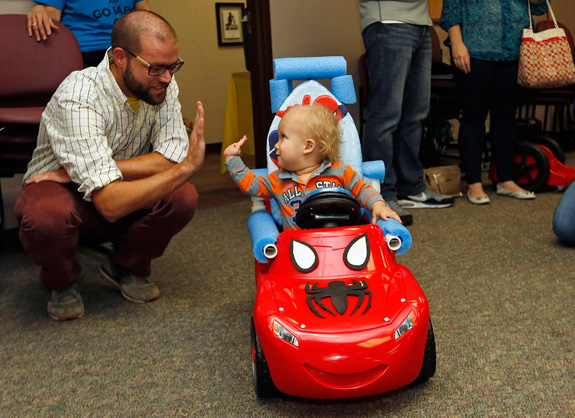Power Wheels Offer Lift For Kids With Special Needs

Christopher Roe high-fives Go Baby Go workshop leader Sam Logan in his newly modified Fisher-Price Power Wheels Lil’ Lightning McQueen. (Kyle Robertson/Columbus Dispatch/MCT)
Toddler Christopher Roe zoomed across the room in a motorized car, stopping in front of grown-up Sam Logan to share a giggle and reach out for a high-five.
As Christopher’s mother, Lauryn Roe, watched him operate the toy on his own, she smiled and wiped away tears.
She and other helpers spent part of a recent afternoon modifying the Fisher-Price Power Wheels car so it could be driven by the 1 1/2-year-old boy, who has a severe form of spina bifida and can’t walk without help.
Advertisement - Continue Reading Below
“With this, he’s able to do more, and to do it on his own, and that’s the biggest blessing,” she said. “Something most people take for granted is something he’s fighting so hard for — his independence.”
Roe was among a group of parents, therapists, researchers, toy-company executives, disability professionals and others who gathered in Columbus, Ohio to adapt toy cars as part of a workshop presented by Go Baby Go. The project was founded in 2011 by University of Delaware pediatric researcher Cole Galloway, who sought to create a modification that families of children with disabilities could afford and do on their own.
Logan, an assistant professor from Oregon State University and Go Baby Go collaborator, said there’s no commercially-available device to allow children with disabilities ages 3 or younger to get around.
“You see gains in cognition, motor, social and language from having that active control of your environment,” Logan said. “So for babies and toddlers who don’t have that opportunity, because they can’t crawl or walk because of some physical disability, they’re able to get that exploration and access.”
Logan said there are 40 international Go Baby Go sites — including nonprofit groups, clinical teams, researchers, engineers and community programs — that modify cars for families.
He estimated that about 500 cars are directly related to the University of Delaware project and as many as 500 more are from groups that have formed after accessing material via word-of-mouth or online.
Participants rewired the cars to add on/off switches and large-button steering wheels that the toddlers could touch to make the cars go. They used PVC pipes and pool toys — foam kickboards and water noodles — to support the children. Straps with Velcro and buckles held the kids in place as they circled a gymnasium race course in the cars.
Heather Frey’s 16-month-old son, Benjamin, received a donated car. A perinatal stroke left him weak on the left side, but with the car, he was able to quickly scoot across the gym to another child, waving and blowing kisses.
Pat Tietz, a physical therapist who spearheaded the event, said each car costs about $200 to buy and adapt.
Kirsten DiCarlo, marketing director for Fisher-Price, was teary as parents were given the toys, calling it “the ultimate” of being able to make a kid smile or laugh or allow a mom a break.
“These people are giving their kids the world. … This has changed their whole lives.”
Read more stories like this one. Sign up for Disability Scoop's free email newsletter to get the latest developmental disability news sent straight to your inbox.

